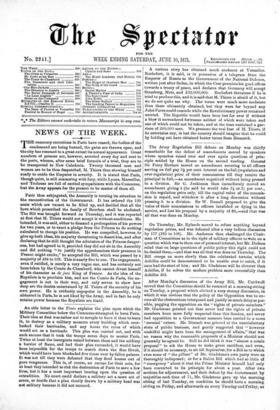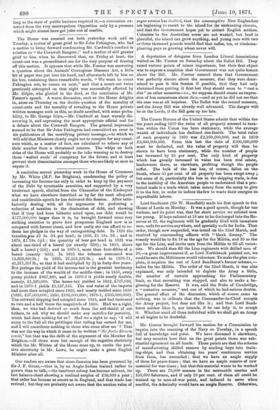After Monday's discussion of the Army Bill, Mr. Cardwell moved
that the Committee should be resumed at a morning sitting on Tuesday, a proposal which elicited a very stormy discussion, in which it was obvious that the policy of the Opposition was to ex- cuse all the obstructions interposed and justify as much delay as pos- sible, pegging the opposition on the "rights of private members." Mr. Gladstone pointed out that never had the rights of private members been more fully respected than this Session, and never had opposition to a Government measure been carried to a more
unusual' extent. Mr. Disraeli was grieved at the unsatisfactory state of public business, and gently suggested that " however unskilful might have been the management of affairs," that was no reason why the reasonable proposals of a Minister should not generally be agreed to. Still he did think it was "almost a comic proposal" to ask the House to make great sacrifices, and even, if it should be necessary, to sit till September, for a Bill as to which even some of "the pillars" of Mr. Gladstone's own party were so thoroughly indisposed ; or for a Ballot Bill which had so little of " emergency " about it that the Prime Minister himself had only been converted to its principle for about a year. After two motions for adjournment, and their defeat by the Government by majorities each time of 71, Mr. Gladstone gave up the morning sitting of last Tuesday, on condition he should have a morning sitting on Friday, and afterwards on every Tuesday and Friday, as
long as the state of public business required it,—a concession ex- torted from the very unscrupulous Opposition only by a pressure which might almost have got juice out of marble.



































